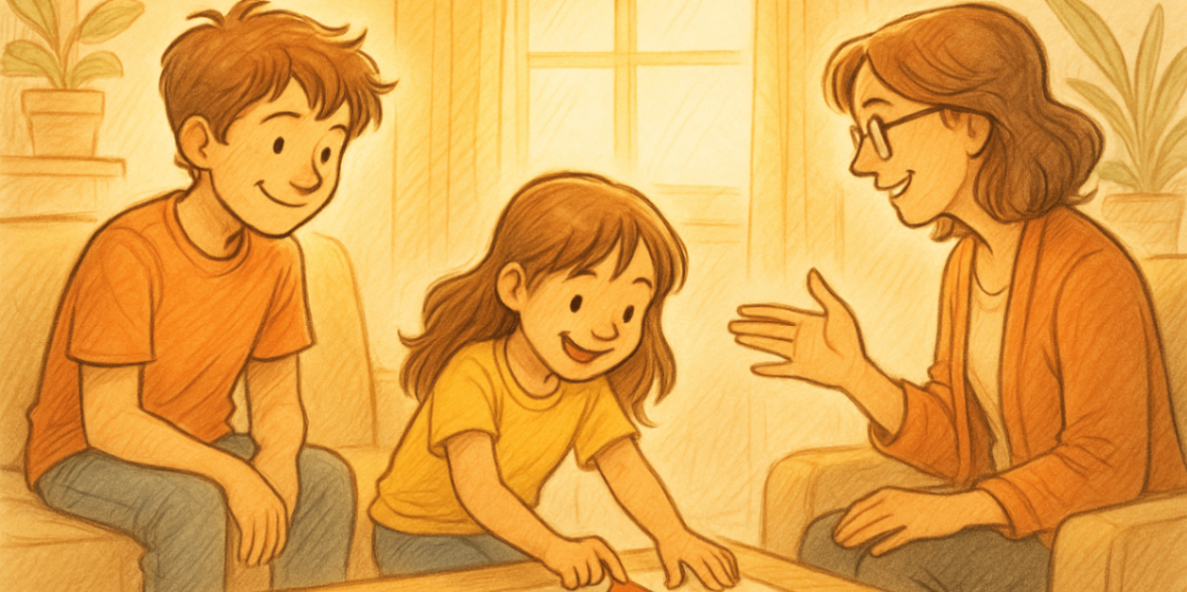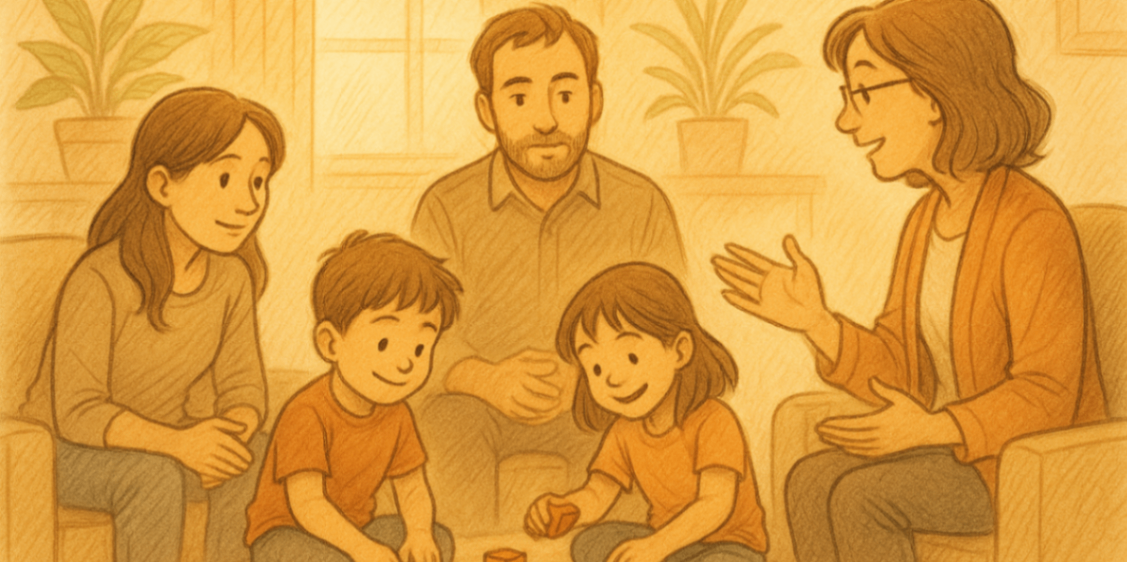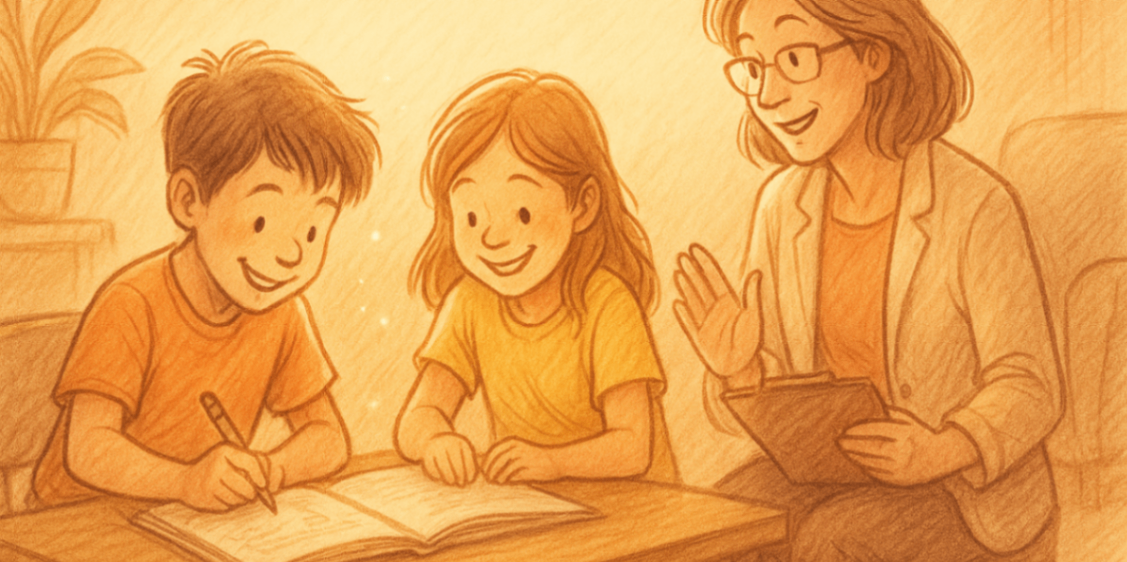
behaviour therapy for siblings: supporting the family
11 September, 2025
Latest Update November 20, 2025
The bonds you have with your siblings can be some of the longest you will ever know — full of love, shared history and, at times, conflict. When sibling tensions become frequent or escalate, they can affect the whole family’s wellbeing. Behaviour therapy for siblings offers practical, evidence-informed tools to repair relationships, reduce conflict and strengthen family resilience. By teaching better communication, conflict-resolution and boundary-setting, sibling-focused interventions help create a safer, more supportive home for everyone — whether that looks like one-off family sessions, ongoing sibling support behaviour therapy, or broader whole-family programs.
Key Highlights
Here are the main points from what we said about sibling behaviour therapy:
-
Behaviour therapy for siblings focuses on practical skills (communication, boundaries, problem-solving) rather than blame.
-
Family-based sessions create a neutral space to identify repeated patterns and replace them with healthier routines.
-
The core aims are improved communication, fair conflict resolution, repaired emotional wounds and stronger trust across the family.
-
This approach supports all ages — children, teens and adults — and can be scaled into behaviour therapy whole family programs.
-
Effective programmes combine in-session practice with everyday family behaviour strategies to make change stick.
-
Services can be delivered in-person or via telehealth, and can be adapted to NDIS-funded or private contexts where appropriate, including supports for sibling relationships NDIS planning.
Why Behaviour Therapy Matters for Siblings Too

Sibling relationships shape emotional patterns, social skills and identity across the lifespan, but they often receive less direct attention than parent–child or couple relationships. Ongoing rivalry, misunderstandings or unresolved hurts create tension that affects daily life and family decision-making. Sibling support behaviour therapy addresses those relational patterns directly, helping siblings and the wider family to recognise triggers, reframe negative assumptions and build alternative ways of interacting that reduce conflict and increase mutual respect.
2025 Update – The Role of Siblings in Behaviour Therapy
Recent research emphasises the importance of including siblings in behaviour therapy programs, especially in families where one child has additional support needs. For example, siblings can act as role-models, enhance their own social and emotional skills, and strengthen the family support network.
Key findings:
-
Involving siblings in structured activities improves understanding and empathy. i
-
Sibling participation assists generalisation of skills (the child with therapy transfers skills into everyday interactions with siblings).
-
Addressing sibling emotional needs reduces jealousy, isolation or confusion (common in families where one child receives intensive therapy).
In 2025, behaviour therapy providers increasingly adopt a family-wide approach — trusting that sibling engagement leads to better outcomes for all children in the household.
What is Behaviour Therapy in the Context of Sibling Relationships?
In the sibling context, behaviour therapy brings siblings together in a structured, evidence-informed process that mixes behavioural techniques with cognitive and systemic ideas. Practitioners use methods from Cognitive Behavioural Therapy (CBT), family systems work and practical behavioural coaching to:
-
identify repeating interaction cycles that escalate conflict,
-
teach skills for emotion regulation and problem solving, and
-
rehearse new behaviours in a safe setting so they generalise at home.
This is not “just talk” — sessions emphasise skill-building (active listening, “I” statements, boundary-setting) and real-world practice, which is why it is sometimes offered as behaviour therapy whole family programmes to reinforce change across household routines.
Key Goals of Behaviour Therapy for Siblings
The main goal of behaviour therapy for siblings is to restore respectful, functional relationships and reduce the emotional load on the whole family. Typical goals include:
-
Improve conflict resolution skills: Teach structured ways to address disagreements without escalation.
-
Heal past emotional wounds: Create guided opportunities to name hurt and move toward repair.
-
Build healthier boundaries: Help each person understand and respect limits around privacy, time and physical space.
-
Enhance communication: Practise clear expression and effective listening so concerns are solved early.
Successful plans pair these therapeutic goals with family behaviour strategies so gains transfer into daily routines and long-term habits.
Who Can Benefit—Children, Teens, and Adults
Sibling therapy can be a big help for any family member. This includes young children and also adult siblings. The therapy is not just for one age group. Every stage of life has its own problems. A therapist will work with you to look at your unique needs. They will focus on what is important for your psychological development.
For kids, therapy often helps with things like how they act, how they get along with others, and how to deal with fights between them. For teens, it can help them get through the hard parts when life changes and their place in the family shifts. Adult siblings can also get a lot out of it. They may need help with things from childhood, problems over inheritance, or the stress of looking after older parents, and therapy can be useful during these life transitions.
This therapy gives you a place to feel close again and start to heal. It does not matter how long the problems have been there.
|
Age Group |
Common Issues Addressed in Therapy |
|---|---|
|
Children |
Sibling rivalry, behavioural problems, difficulty sharing, communication challenges. |
|
Teens |
Increased conflict, navigating independence, life transitions, feeling misunderstood. |
|
Adults |
Unresolved childhood roles, caregiving responsibilities, financial disputes, grief, and loss. |
Signs Your Family Might Need Behaviour Therapy

It can be hard to tell when fights between siblings get to be too much. If you notice that talks with your sibling often lead to fights or there is a lot of silence after them, this could mean there is a problem with the sibling dynamics. These things can make your family story feel less happy and cause issues that may last a long time.
Feelings of guilt, anger, or feeling like you have to "walk on eggshells" are some signs that something might be wrong. If you want to get closer to someone but feel unsure how to do it, talking with a therapist can help. Here are some of the main things that show professional support might be good for you.
Common Challenges Among Siblings
Sibling conflict can happen for many different reasons. A lot of the time, it comes from patterns that start early in life. These problems may keep going as we grow up, and they can change how we feel about each other for years. Negative thought patterns, like thinking the worst of what your sibling does, can turn small problems into big fights.
Life transitions like losing a parent, having problems about an inheritance, or taking care of someone more than others can bring up past trouble between the people involved. The therapist gives people a chance to talk about all these issues in a right and open way. This lets everyone feel heard and be fair with each other.
Here are some usual problems that make families ask for help:
-
Unresolved sibling rivalry: When the sibling rivalry stays. It happens when there is still fighting, or when someone thinks parents pick favorites.
-
Communication breakdowns: Some people have problems talking and listening to each other. There can be old mistakes. Pig poor easy ways to talk.
-
Differing values or life choices: Family might not feel happy about how the other raises kids, works, or what they believe. Someone might judge each other for it.
-
Grief and loss: Family may have a hard time helping each other after losing a family member. People feel pain and do not know how to give support.
-
Estrangement: Sometimes family does not talk for a long time on purpose. There can be a big gap with no contact or you feel far from each other.
Strategies to Include Siblings in Behaviour Support
Family therapists have several ways to help siblings get closer and have better bonds. They want to make a place where every person in the family feels safe, and where they can say what they think or feel. Most of the time, this process uses hands-on skills and practice, not just long talks. These methods help the family talk and listen to each other in a better way.
Therapists use cognitive behavioural therapy to support siblings. The therapist helps them see each other in a different way. The family works together with the therapist to learn new ways to talk and solve problems. These methods help the family to have better communication and handle disagreements in a good way. The next parts will look closer at these important strategies.
Positive Reinforcement Strategies
A big part of making positive changes is to support good behaviour. You may think this is about giving rewards to kids. But the same idea can work for adults too. In this form of treatment, positive reinforcement is when you notice and support healthy ways people act with each other.
For example, a therapist will help siblings practice active listening. The therapist may then praise them when they really listen to each other. This helps the siblings feel good about their effort. It can also encourage them to keep using active listening outside of the therapy sessions. The main idea is to build up their confidence by noticing and celebrating each small win.
Here are some ways that help people have good talks with each other:
-
Acknowledging contributions: It’s good to notice when a sibling is trying, whether they help with money, offer support, or do things that make life easier.
-
Celebrating milestones together: Try to show up for things like birthdays, promotions, or big wins. Being there can help everyone feel close and make good memories to look back on.
-
Expressing appreciation: A few kind words or a simple thank you can really help bring people together and fix tough spots in a relationship.
-
Focusing on strengths: Talk about what each sibling does well and how that helps the whole family.
Communication and Conflict Resolution Skills
One big thing people get from sibling therapy is how to use effective communication. A lot of the time, siblings fight because they do not really understand each other or they have picked up bad ways to talk from when they were young. The therapy gives people clear ways to stop these problems. It helps them talk with each other in a way that is easy to get and kind.
Conflict resolution in therapy is not about finding who is right or wrong. It helps people feel heard and understood. A therapist shows you real communication skills to use when you have a problem. These ways can help you solve issues nicely, both during and outside of therapy sessions.
Therapists often teach the following techniques:
-
Using "I" statements: Say how you feel in a clear way, without blaming the other person. For example, say "I feel overwhelmed" instead of "You never help".
-
Practicing active listening: Listen closely and then repeat back what you hear. This shows you understand your sibling's side. Active listening can help both people feel heard.
-
Setting ground rules for discussions: Talk about what rules should be followed, like no yelling. Agree to take a break if things get too heated.
-
Focusing on one issue at a time: Talk about only one problem at a time. Do not bring up old problems during the same talk.
-
Reaching out with openness: Show you want to solve the problem and are ready to listen. Do not blame the other person.
Building Healthy Family Dynamics With Therapy

Improving family dynamics is not just about talking. It also needs actions from all people involved. In therapy sessions, the therapist brings in different activities and exercises for the group. These help people rebuild trust. They also help people feel closer to one another.
This form of therapy is active. It often moves fast from one task to the next. The therapist might give homework. They ask everyone to practice new ways of talking or acting between sessions.
These planned ways of spending time together let siblings see each other in a new way. They also practice how to act kindly with one another. The fun activities and teamwork tasks are made to fit what your family needs most. Now, let’s see some examples of what you can expect.
How Behaviour Therapy for Siblings Fits with Your NDIS-Supported Plan
When a child’s NDIS plan includes behaviour supports, there is increasing recognition that even siblings benefit — because family dynamics impact functional outcomes. Families may use part of their plan to fund sessions that include siblings, or access family-training modules under behaviour supports.
• If your child’s goals include family participation, siblings may join sessions as “peer partners” or “communication buddies”.
• Many behaviour practitioners advise parents to budget for sibling-inclusive sessions or workshops (which support sibling understanding, reduce sibling stress and build a cooperative home routine).
• Ensure the provider clearly states how sibling involvement links to the child’s goals, family outcomes and funded support line items (e.g., Improved Daily Living, Improved Relationships).
At daar, we help families across Sydney to design behaviour-therapy plans that include sibling sessions when appropriate — making the home environment a unified support system.
When to Seek Professional Family Behaviour Support
Knowing when to get help can feel hard. If you feel that conflicts happen often, leave you feeling tired, or cause you and your loved ones to grow apart, it may be time to reach out for help. If you want your relationship to get better but talks always break down or feel too intense, a therapist can offer the help you need. Big life transitions, like going through grief or taking care of someone, are also good times to think about therapy.
Finding the right therapist is the first step. Look for someone who is a licensed expert, like a clinical social worker, a social worker, psychologist, or LMFT. They should have practice in working with family and sibling problems. The most important thing is that your family feels at ease and trusts the therapist. A good fit will help make a safe space. This lets everyone in your family talk openly. So, find a therapist who understands what your family needs.
Conclusion
Behaviour therapy helps a lot with mental health for both individuals and whole families. It is good for sibling dynamics and family life. When people work on common problems and learn to talk in a healthy way, everyone at home can feel better and get along. Using things like positive reinforcement and also having structured play can really help siblings get along better. This can lead to more calm and happiness at home.
If any of the signs or patterns above sound familiar, the quickest way forward is a structured assessment and a practical plan. Behaviour therapy for siblings can stop cycles of hurt and give your family clear, sustainable strategies to rebuild trust — including NDIS-aligned options where appropriate. Book your consultation now.
Frequently Asked Questions
Can behaviour therapy help adult siblings with long-standing issues?
Yes, family therapy really works well for adult siblings who have problems that have lasted a long time. It can give the siblings a place to talk about things that happened when they were kids. People can also work through fights that come up about caregiving or when there is talk about who will get what in the family. Family therapy helps heal old hurt feelings as well. This can bring positive changes. It helps siblings get a better understanding of one another.
How does virtual sibling behaviour therapy work?
Virtual therapy lets every family member join therapy sessions, no matter where they are. This is good for families with siblings living in different places. A therapist leads these sessions on a video call and helps make a safe space for everyone. It is just like meeting in person and can help with effective communication and exercises that guide the whole group.
What are the signs that siblings should try behaviour therapy?
Common signs are siblings fighting a lot, not speaking for long times, or staying away from each other. It can feel like you walk on eggshells and there is trouble talking about feelings. If you want to get closer but are not sure how, this type of therapy can help. It offers a space without fear of judgment, so real change can happen and you may see significant improvements.
.svg)












